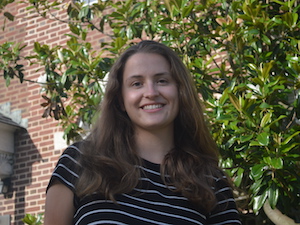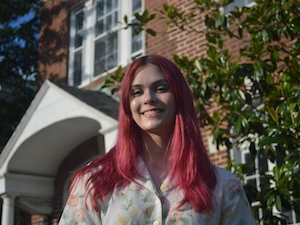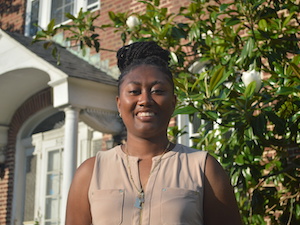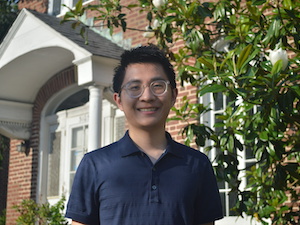2022 Week 3: Youth and Education
Cionne Gates | By Peaceful Means
This week has been dedicated to staff orientation, so it included us preparing all the logistics for the program in addition to participating in team building exercises. Since most of the returning senior counselors have had in person experiences, they have much more memorable memories at St. Frances which allowed them to establish intimate connections. Throughout the week, our meals were covered, so we were supporting local business while also finding time to communicate our goals and expectations of the program. Given our short period of time to get to know each other, the conversations during lunch felt more fluid to understand who everyone is outside of the camp. Moreover, the workshops we had focused on conflict resolution and establishing health boundaries between the counselors and the campers, and there seems to be a hierarchy power within the counselors between the senior staff, junior counselors that were previous campers and the youth workers. Most of the workshops surrounded within our names or positionalities in the world and how we can effectively uplift and encourage the campers to express themselves in uncomfortable situations. For instance, we had this name game where we would throw the ball to someone and recite the person, we are throwing it two, but then multiple balls were being thrown in so we had recitations in reverse. This exercise was to teach us about managing dissenting opinions and overall chaos especially in facilitator roles, but also getting outside of our comfort zone by meeting new people. Once we covered the logistical aspects of the program, such as COVID policies and daily schedule, we started designing our rooms for the age groups that we were working with during the last day of orientation. We also started brainstorming what activities we want to execute based on the peace hero for a week, like doing a mock debate as the peace hero activity for Cori Bush or making musical freestyles for Harry Belafonte. Overall, I’m ecstatic about finally starting the first week of peace camp in person and meeting all the wonderful campers.

Hélène Girard | Village Learning Place
This was my first week with the students! I am now officially a classroom assistant for 10 spritely 5th and 6th graders. Some have been involved with the Village Learning Place for a couple years now and some are here for their first time, but almost all of them have found a solid friend group to start off their summer program. I see my biggest role in the classroom as being an advocate for the students to the teacher. 10/11/12-year-olds have a tendency to mutter the answer under their breath if they are unsure of themselves or if they are not quite comfortable with the vulnerability of raising their hands, so I make a special point of keeping an ear out to catch those whispers and say, “Yeah, that’s exactly right. Hey, Mr. Daniel, ___ has a good example!”
I also find my identity as a female STEM major showing up often. Mr. Daniel is a scientific man, so one of our projects as a class is to build two scooters from scratch using these huge kits of hundreds of metal parts and fastenings. I’m in charge of one of the scooter groups, and I do find myself paying extra attention to ensuring that everyone gets equal opportunity to fasten the bolts. Another time, during a lesson on the order of operations, the table I was working with started getting on a roll, and I found myself in a dream situation: I would finish a question, they would answer, and then they kept on saying, “So what’s the next question?” They wouldn’t always be right, but I told them what parts of the thinking process they were already good at, and as a team, they could usually find a quick, correct answer. That feeling of having an excited groups of tweens ask for MORE math problems: unbeatable. I don’t want my leniency to be the reason any child thinks that they’re not good at building or at math, and even better, I want to try to get them thinking that they ARE good at those things.
 Helen Lacey | Dent Education
Helen Lacey | Dent Education
This week involved a lot of administrative tasks as we prepare to welcome students next week. I was trained in food distribution and was able to visit a few of the sites I’ll be working at throughout the summer. We also continued moving materials in preparation for our summer kick-off on Tuesday. I’d say that my favorite (non-administrative) moment this week was when a presenter from the African Diaspora Alliance came during coach training to speak about anti-Black racism. The presenter described the non-profit industrial complex, a complex term used to describe white people creating non-profits that are ineffective/detrimental to addressing the systemic issues they attempt to solve. The presentation made me reflect on my identity as a white person in the non-profit sphere and the importance of remaining self-aware of my privilege while understanding that I will never understand issues of racism as well as people of color. The presenter also highlighted the organization “No White Saviors,” which calls out non-profits run by white people that contribute to the non-profit industrial complex.
Now that I have finished onboarding and am about to start the summer, as I reflect back on the past two weeks I think that the thing they have done most effectively is build community. The daily ritual of opening and closing circle, which allows all staff to spend 15-30 minutes learning about one another on a deeper level, has really helped me feel connected to the Dent community. I’m excited to see how these rituals play out on a larger scale as the Dent team expands to include high schoolers next week. I hope that the interconnectedness and strong bonds within the community only grow stronger as more people continue to be added to it.
 Sophia Park | Child First Authority at Calvin Rodwell Elementary/ Middle School
Sophia Park | Child First Authority at Calvin Rodwell Elementary/ Middle School
Unlike most of my peers, this week was a very relaxed week for me. I feel like this week can be perfectly described as “the calm before the storm.” The school has just closed for summer break, and only the administration for the summer programming has been coming into work. Throughout this week, I have been sitting in on planning meetings for the upcoming weeks. The program that I am working on is the Johns Hopkins Center for Talent Youth (CTY) program, and it is the first time Calvin M. Rodwell Elementary and Middle School are hosting this program. In the midst of this generally calm planning, there are some areas of stress that I did not anticipate. As I mentioned in my blog last week, this school is more than a school for most of the families of these students. It is also a place where their kids get fed, looked after, and taken care of. The CTY program does not offer daycare after school, and therefore, some families cannot make it in time to pick their kids up. As well, the teachers and administrators have to watch all the students eat at two separate times, before they, themselves, can eat. This puts a burden on scheduling, as we need to figure out when it is best for teachers to eat and how long we can give them for lunch. Logistically, it is also quite difficult to figure out where students can be picked up and dropped off. I think I failed to realize how much went into planning a typical schedule to accommodate a wide range of students. I always knew curriculum and teaching can be difficult but effective scheduling is a different feat in itself. I am excited to start interacting with teachers next week and to finally meet the incoming students in two weeks. I am still not quite sure what my role is within the program but I am open to all different types of responsibilities and assume that I will be taking on a variety of different challenges. My main goal for the next few weeks is to keep an open mind and absorb as much new information as I can!
 Abigail Quashie | St. Francis Neighborhood Center
Abigail Quashie | St. Francis Neighborhood Center
This week marked the beginning of the Summer of Service Excursion Youth Camp at SFNC! That means that my schedule this week was a bit different from the past two weeks because I had to incorporate class time. I cannot lie, I was extremely nervous going into the week because I was unsure about how my interactions with the children would go, but I can very happily say that everything went great this week! My day usually starts around nine when I get to the center. Almost all the time, I greet Mr. Dariel at the door with a good morning, then I put my lunch in the refrigerator and head upstairs to the office. I do a bit of day planning and lesson preparation until around twelve. Then, I eat my lunch and at 12: 30 I report to the classroom for my service-learning lesson.
Service learning is similar to community service, but the biggest difference is the role that the students play. They are supposed to take a more active role in planning and participating in the projects and most importantly, they reflect on the lessons they learned. For the summer camp, the students have three weeks together, so I decided to break their time up into first and second weeks to do preparation/ research and second/third weeks doing the project, with reflection at the end of each day.
On Monday, I met Ms. Reagan’s class of 1st and 2nd graders. Their service project is about feelings: what they are, what things/ actions affect them, and how to express them. We made memory books together and talked about times when we felt happy or sad. Then on Tuesday, I met Ms. Arlene’s 3rd and 4th graders and we talked about food insecurity, sustainability, and lots of gardening ( and did some silly dances in between). On Thursday, I met Ms. Ligon’s Kindergarteners and we focused mostly on kindness: what it is, how to spot it, and how to be kind to others. We did some skits together and I think that I have discovered the next generation of Oscar and Emmy winners, their raw talent was undeniable! Finally, on Thursday, I met Ms. King’s 5th and 6th graders, and we had conversations about homelessness. I was expecting them to have the least amount of energy, but they had more energy than any of the other classes which I appreciated because they carried the conversation.
Overall, we had a great first introduction week and I am excited to start this week with some more background research and planning of our projects.
 Ethan Wang | Code in the Schools
Ethan Wang | Code in the Schools
It’s a sunny morning. I pack my laptop, charger, lunchbox, and umbrella into my backpack and ride the JHMI a few short stops to the North Avenue. A co-worker unlocks the front door for me and I have some time to do final touch ups on the employee handbook, which contains crucial information like daily schedule, important links, and contact information for the youth junior developers that will be partaking in the CodeWorks program starting next week. Then I participate in the program management meeting, listening to the overall CodeWorks plans to be implemented and receiving multiple suggestions for the Covid Guidelines section in the employee handbook. Throughout the day, I cross-check data for registered applicants to the CodeWorks program and move them into their respective tracks like intro python and intro web dev. As I warm up for lunch, spaghetti and meatballs (leftovers from last night’s dinner), an upbeat instructor for the CodeWorks program offers to make coffee for me and describes their experience with school and what brought them to CodeWorks. After I eat lunch, I continue working on the orientation slides and prepare to send emails out to the in-person and virtual cohorts about orientation day.
In our BITES session on Wednesday, we learned about incarceration and were shown figures on how closely it related to the White L and the Black Butterfly. I am thankful to have learned more about the for-profit industry in some prisons and the social structures that further inequality.
